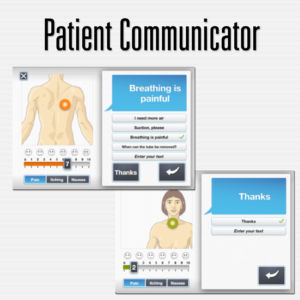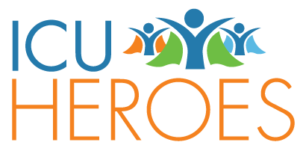SCCM dedicates resources toward helping the multiprofessional critical care team work successfully with patients and families before, during and after an ICU stay.

THRIVE Initiative and Post-Intensive Care Syndrome
SCCM is the leader in addressing post-intensive care syndrome (PICS). First defined by experts, PICS is a made up of health problems that remain after critical illness. These problems can involve the patient’s body, thoughts, feelings, or mind and may affect the family.
SCCM reaches out to patients and families through its THRIVE initiative, which aims to educate patients, their families, and the healthcare community about PICS and provide resources.

THRIVE ICU Facebook @ThriveICU
MyICUCare
MyICUCare.org is a comprehensive website aimed at educating patients and families about their ICU stay and about life during and after the ICU. The site includes free resources, education about PICUs, and information about SCCM’s THRIVE ICU initiative.
Visit sccm.org/MyICUCare for more information.

Patient Communicator App
The newly updated Patient Communicator by SCCM is designed to improve communication among patients, families, and caregivers. With translations in 18 languages; a diary feature; options to easily communicate about pain, moods, and needs; a glossary of terms and other education materials for patients and families; the Patient Communicator app can help ease the stress of a hospital stay.
Annual Downloads: 1163
LEARN MORE >
Awards
ICU Heroes Award
Promotes the importance of patients and families are an integral part of ICU care.
Recipients
Jake LaRose, a 4-year-old boy who survived 99 days in the pediatric intensive care unit at Weill Cornell Medical College in New York City with acute renal failure.
Ralph Gervasio, a 66-year-old-man defying the odds and low survival rate of a rare lung condition to return to a healthy lifestyle with the help of professionals at Tennessee Valley Healthcare System VA Medical Center.
Cheyenne Vandergrift, a 16-year-old girl who underwent ECMO at the Medical University of South Carolina and is now thriving in pediatric rehabilitation and continues to exceed expectations.
Darrell Raikes, 52, entered the hospital for routine surgery ended up spending 34 days in the intensive care unit after being diagnosed with ARDS. Darrell’s physical recovery was only part of his journey, and he stayed in touch with hospital staff at The University of Kentucky even through bouts of anxiety and depression. He has become a champion for patients and families and is always looking for ways to advocate for ICU survivors.
Family-Centered Care Innovation Award
Presented to an ICU or program that demonstrates novel, effective methods of providing care to critically ill and injured patients and their families.
Orlando Health
Orlando, Florida, USA
WeCU Boards, lamenated boards placed in all ICU patient rooms with sections to place photos, write in key patient information on their preferred name, interests, role, and any other information that describes the individual patient. Patients and families highly rated this innovative way to bridge relationships between ICU caregivers and patients.
University of Wisconsin – Madison, WI
The Critical Care Nurse Communicator Program’s mission is to align patient, family, and clinician goals to achieve outcomes that matter most to the patient. Patient and family support interventions include management of a family meeting protocol, daily visits with patients and families to identify unmet needs, facilitation of specialty palliative care consultation when indicated, as well as end of life and bereavement support.

HOW YOU CAN SUPPORT OUR MISSION
SCCM has a variety of resources available to patient and families. Sponsorship opportunities are available to help provide wider distribution of these resources. Opportunities include the Patient and Family Communicator App and the Patient and Family Care Collaboratives.
Improving Patient Care After the ICU Through the Collaborative Model
Post ICU Clinic Collaborative
SCCM established the Post ICU Clinic Collaborative to foster a network of hospitals focused on developing Post ICU Clinics to provide comprehensive care to ICU survivors. The Collaborative’s goals are to improve patient outcomes after ICU discharge, address post intensive care syndrome (PICS) using a multidisciplinary team, decrease readmission rates and morbidities, improve the quality of life for patients after critical illness, and collect data for quality improvement. Participants share and gain knowledge related to how to set-up and sustain a Post ICU Clinic while post-ICU patients benefit from caregivers who understand their needs. Currently, team members from twenty sites in six countries meet for monthly calls to exchange ideas and share successes and challenges.
LEARN MORE >
Hospitals Currently Participating in SCCM’s Post-ICU Clinic Collaborative
Captain James A. Lovell Federal Health Care Center, CARES Post-ICU Clinic, Hines, IL
Eskenazi Health, Indianapolis, IN
Geisinger Medical Center, Danville, PA
Guy’s and St. Thomas, London, UK
Hospital Universitario de Fuenlabrada, Madrid, Spain
Jefferson University, Philadelphia, PA
Kingston Health Sciences Centre, Kingston, ON
Mount Sinai Hospital, New York, NY
National Jewish Health, Denver, CO
NHS Greater Glasgow, Glasgow, UK
St. Bartholomew’s Hospital, London, UK
The Springfield Clinic, Springfield, IL
University Hospitals Cleveland Medical Center, Cleveland, OH
University of Kentucky, Lexington KY
University of Michigan, Ann Arbor, MI
University of Pittsburgh Medical Center, Pittsburgh, PA.
University of Utah – Intermountain Medical, Murray, UT
Vanderbilt University – ICU Recovery Center, Nashville, TN
Wake Forest Baptist Health, Winston-Salem, NC
Washington University School of Medicine, St. Louis, MO
Peer Support Collaborative
In addition to the Post-ICU Clinic Collaborative, SCCM spearheaded the development of a survivor’s network called the Peer Support Collaborative. We currently have 16 active sites in eight countries that bring together ICU survivors who have unique knowledge and skills that they can share with other survivors to help improve recovery through this survivor community. In face-to-face groups, survivors offer mutual support and share solutions related to ICU recovery. There are also social media focused networks supporting patients and their families.
LEARN MORE >

HOW YOU CAN SUPPORT OUR MISSION
SCCM is on the cutting edge of patient- and family-centered care, with a long history of addressing improvements in this area during an ICU stay, and now expanding its scope to improve long-term outcomes and issues related to PICS. A donation to SCCM can advance quality improvement and patient safety through it many patient- and family-focused initiatives, including the THRIVE initiative.
LEARN MORE >
Sponsorship and grant opportunities are available to fund SCCM’s patient support initiatives, from collaboratives, to guidelines. Learn more about grant and sponsorship opportunities in these emerging areas by contacting grants@sccm.org.
WHY IT MATTERS
Patients and families play a critical role in the success of their ICU care. SCCM gives critical care team members the tools and resources to integrate patient, family, and caregiver perspectives into the process to help ease the stress of ICU stays and lead to better patient outcomes.



